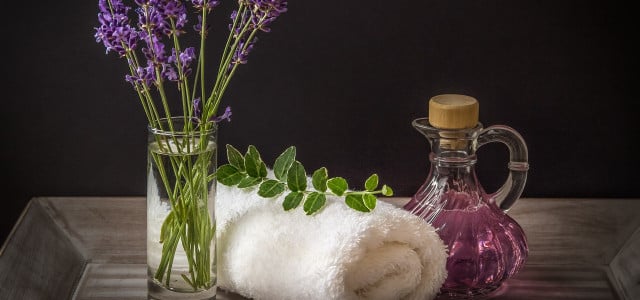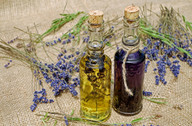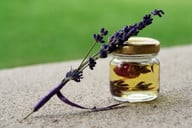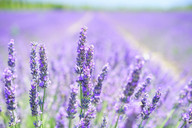
Lavender oil is more than just a fragrant relaxation aid. We’ll show you what effect it’s said to have and in which cases you can use it.
Lavender oil is the essential oil of the lavender plant, with extensive uses. It has a seemingly paradoxical effect – it can stimulate and relax, refresh when you are tired and calm when you are stressed. In the physical area, it has an antibacterial, wound-healing, pain-relieving and blood circulation-stimulating effect.
Lavender oil: effect and use for psychological complaints

(Photo: CC0 / Pixabay / Couleur)
The areas of application for lavender oil are diverse. For psychological challenges, lavender oil can have a calming effect.
- Lavender oil can help with sleep disorders that have no underlying physical or psychiatric causes. This is the result of a meta-study by the University of Freiburg. A pillow spray can be made from 100ml distilled water, 50ml alcohol and 10 drops of lavender oil.
- Lavender oil can also be effective against inner restlessness and anxiety. This was explained by the biologist and aromatherapist Dr. Elke Puchtler from Erlangen told Deutschlandfunk. She is a member of the study group for the history of the development of medicinal plants. According to her, lavender oil has a stress-reducing, anti-anxiety effect and reduces mental circles.
Lavender oil: effect and use for physical complaints
- If you have a headache, apply a few drops to your upper lip to inhale the scent. According to a study, this significantly reduced the pain during attacks in people with migraines.
- If you have an insect bite, a drop of lavender oil can help relieve the itching.
- According to the German Hypertension League, if you have low blood pressure, a full bath with the addition of lavender oil brings refreshment and stimulation.
- A study shows that lavender oil supports the fight against multi-resistant germs.
- According to a study, lavender oil can be effective against coughs and bronchitis. However, the participants were given the oil in the form of capsules.
- Warm compresses have been used as a home remedy to combat coughs for centuries. The heat is intended to loosen the tense muscles. A few drops of lavender oil can have an additional beneficial effect.
Important: If you are prone to allergies, do a tolerance test before using essential oil. To do this, place a drop of the oil on your forearm. If no allergic reaction occurs after 48 hours, you can use the oil.
Fragrance lamp, bath additive, etc.: This is how you can develop the effects of lavender oil
You can use lavender oil for the above-mentioned complaints. However, you don’t just have to do this in pure form. Instead, there are several ways you can use lavender oil:
-
Fragrance lamp: You can fill the lavender oil into special atomizers and the device will distribute the scent of lavender throughout the room. You can also use a classic fragrance lamp with a tea light and a bowl above it.
-
Skin oil: You can buy ready-made skin oil with lavender oil. But you can also mix it yourself. Use a skin-friendly oil of your choice and add a few drops of lavender oil. Lavender oil is best tolerated when you apply it to your skin in diluted form.
-
Bath additive: You can also buy bath additives with lavender – but you can also make them yourself. To do this, pour hot water over dried lavender flowers and let them steep briefly, then you can add the decoction to the bath water.
-
Spray: To make a homemade spray with lavender oil, you need a few drops of it, add a few drops of clear alcohol, such as vodka, and distilled water.
Recipe for homemade lavender oil for rubbing and bathing

(Photo: CC0 / Pixabay / Devanath)
You can find pure essential lavender oil in health food stores and pharmacies as well as online** e.g. B. order from Avocadostore or Edel Naturwaren. This is a highly concentrated oil that is produced using steam distillation. Only use this oil diluted with another base oil, such as sunflower or jojoba oil.
You can make lavender oil yourself at home. For homemade lavender oil you only need two ingredients:
- 1 handful of lavender flowers
- 1/2 l vegetable oil (e.g. sunflower oil)
Pour the vegetable oil over the lavender flowers and pour the mixture into an empty wine bottle. Close the bottle tightly and leave it in a sunny place for three to four weeks. Then filter the content.
Cultivation and further information about the lavender plant

(Photo: CC0 / Pixabay / Hans)
The pleasantly scented lavender belongs to the mint family. You can easily recognize it by its characteristic scent. Since it is a heat-loving plant, it rarely grows wild in our latitudes.
The true lavender (Lavandula officinalis, angustifolio or vera), which is grown for medicinal purposes, is mainly at home in Provence. However, you can easily grow lavender yourself in the garden or balcony box because the plant is very undemanding and does not need any special care. It copes with high temperatures and drought just as well as with a lot of moisture.
The herb and flowers of the lavender plant are harvested in sunny and dry weather and dried in the shade. The parts of the plant can be used in a variety of ways. You can make tea blends from lavender, put the dried flowers in a cotton bag and put the lavender bag with your laundry, make lavender oil yourself or print with lavender.
Read more on Techzle\.com:
- Sage oil: effects and uses of the essential oil
- Fennel oil: effects and application
- Which cooking oil is suitable for what? Everything about smoke point & Co.
Edited by Nora Braatz